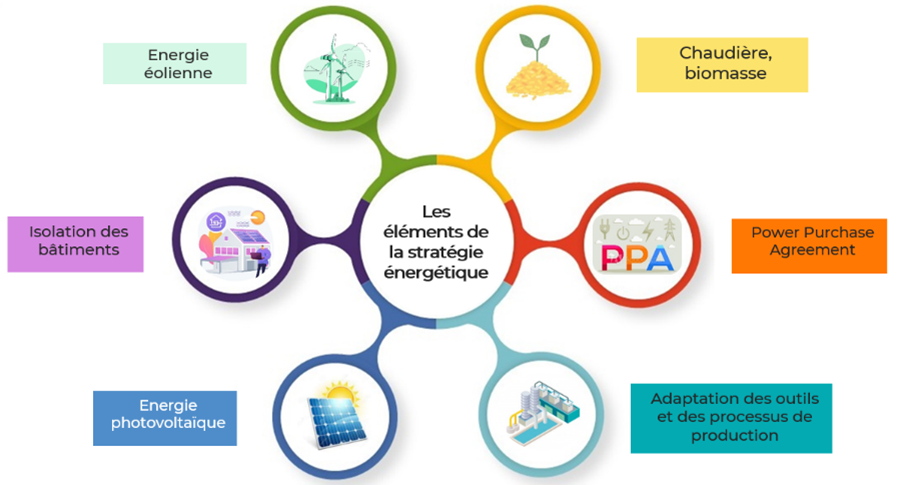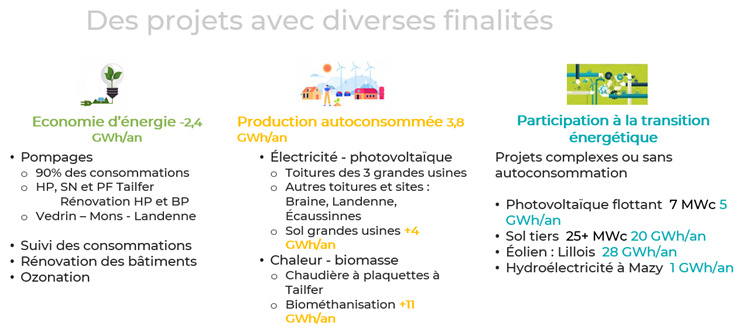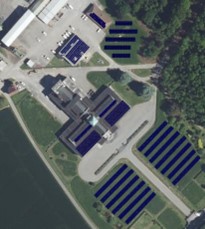VIVAQUA is the public company responsible for the distribution and supply of drinking water in the Brussels Region. WattElse was asked to support it in implementing a global strategy aimed at reducing the energy consumption of its Walloon sites and producing 7 GWh per year (10% of electricity consumption) from renewable sources.
Finding out energy savings
Firstly, the WattElse experts analysed the energy consumption of the 3 major VIVAQUA sites in Wallonia responsible for 80% of the company’s energy consumption, namely Tailfer, Vedrin and Mons.
Drinking tap water has an energy weight directly linked to the pumping and water treatment systems. The simplified water treatment diagram for the Tailfer unit below also makes it possible to understand the different stages from pumping water from the Meuse to tanking it before distributing it.

Source: VIVAQUA
It is important to note that the consumption of the various sites studied is essentially electrical. The Tailfer site, capable of treating 240,000m³/water per day, alone consumes 35 GWh of electricity/year mainly for pumping water, i.e. the equivalent of the average annual electricity consumption of 10,000 Walloon households of 4 people.
The analysis of the data carried out by WattElse quickly made it possible to identify sources of energy savings via in particular:
– The implementation of monitoring of installations in order to detect excess consumption ;
– The reconditioning and replacement of certain pumps which makes it possible to achieve savings ensuring fairly short return on investment times, namely between 5 and 10 years ;
– Replacement of the ozonation system.
Produce renewable energy
Along with identifying potential sources of energy savings, VIVAQUA also wanted to have renewable production potential within its various Walloon sites.
Several renewable sources have thus been studied by WattElse’s energy strategy department:
– the PV solar (on the roof, on the ground and floating)
– the large wind turbine
– the biomethanation
– the heat production from a biomass boiler
– the hydroelectric energy of recuperation
In total, a potential of 97 GWh of renewable production has been identified within the various Walloon sites.
From identifying opportunities to establishing an energy strategy : VIVANEXT
Based on the various potentials for energy savings and renewable production, the multidisciplinary team of WattElse supported VIVAQUA in developing a strategy to meet the company’s vision, namely the self-production of 10 % of electricity consumption and participation in the Belgian energy transition.
VIVAQUA’s energy strategy, developed in the VIVANEXT program, is based on 6 pillars:
– Building insulation
– Adaptation of production tools
– Photovoltaic production
– Wind power generation
– The production of renewable heat
– The power purchase agreement (PPA)

Elements of the energy strategy (source: VIVAQUA)
n this context, a rich portfolio of 22 projects has been defined in partnership with VIVAQUA based on an analysis of the technical and economic feasibility of the various projects. The analysis of financing possibilities was also integrated into the study and this, from several angles: in equity, by the means of a third-party investor or through the establishment of a direct line within the framework of an energy supply contract.
The implementation of the projects will be phased in time with, on the short term:
– Installation of PV panels on the roof
– Installation of a biomass boiler
– Office insulation
– Implementation of consumption monitoring
– Renovation of some pumps
On medium and long term, large-scale renewable production projects will also be studied, such as : the installation of a floating photovoltaic unit, the concession of certain plots with the aim of installing renewable production units, the purchase of energy via PPAs (power purchase agreement/contract for the purchase of electricity), etc.

Source: VIVAQUA
In conclusion, the intervention of WattElse will have, initially, allowed VIVAQUA to benefit from a detailed inventory and to take a step back in a realistic way compared to the various opportunities on basis of technical and economic studies.
But also and above all, this VIVAQUA-WattElse partnership has resulted in a concrete action plan including various projects allowing significant savings and some self-production of energy on the various aforementioned sites and thus actively participating in the energy transition of tomorrow.
If you too would like comprehensive or à la carte support for your energy strategy (whether you are a public or private sector company) by a team of independent experts, we will be happy to be listening to your needs and helping you increase your autonomy !

